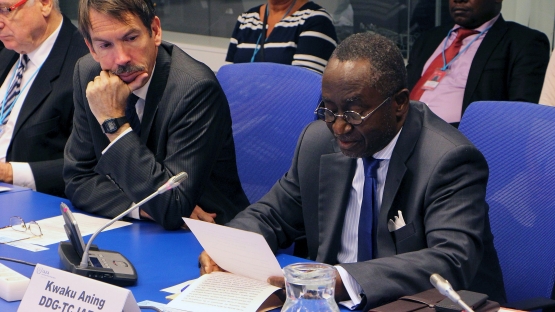Recent years have witnessed remarkable development in the field of nuclear medicine-hybrid imaging techniques, novel analysis methods, and computed tomography procedures have been broadly adopted by medical facilities around the world. Similarly, there has been an attendant growth in the awareness that the safe management and use of radiation in medicine depends on the presence of well-trained medical professionals. While IAEA Member States have made noteworthy investments in nuclear medicine, gaps in expertise remain, especially in low- and middle-income countries (LMIC). In some regions, the nuclear medicine discipline has not yet reached the critical mass necessary to justify targeted training programs, and elsewhere, the available training programs do not satisfy the evolving requirements of the field.
On the margins of the 58th IAEA General Conference, the Agency officially launched the online platform of the distance-assisted training online (DATOL) programme through the Human Health Campus - an IAEA-developed resource for health professionals to find organized and dependable professional educational materials - in order to address these skill gaps. DATOL is now available online and will act as an informative resource and will continue to offer structured access to formative learning. This professional training platform is intended to develop the knowledge and skills necessary for nuclear medicine professionals to conduct high-quality studies and deliver safe, appropriate medical services.
DATOL originally began as a paper-based introduction to nuclear medicine technology - today, DATOL is a harmonized, web-based, distance learning programme suited for personal study, continuous professional development, and formal vocational training for nuclear medicine professionals. The platform offers comprehensive online training resources which cover fundamental concepts and practical applications. Particular attention is paid to recent developments in emission tomography techniques, including single-photon emission computed tomography (SPECT) and positron emission tomography (PET). Although DATOL participants already practice nuclear medicine - a requirement for the program - they nonetheless benefit from the interactive training tools, visual demonstrations, and student support capabilities, which serve to enhance their understanding of the field.
DATOL's thorough interactive syllabus currently offers 39 subjects, which represent approximately 900 hours of study, and strikes a balance between disciplinary knowledge (theory) and situated knowledge (practice). When pursued part-time, between 5-6 hours per week, the DATOL syllabus can be completed with a 2 to 3 year period.
In order to ensure that the correct skills are cultivated by participants, the distance-assisted training platform employs assessment procedures which are standardized regionally and interregionally. Each of the nearly 40 subjects includes a set of exercises, whose results are recorded to verify course completion.
In the medical field, nuclear and radiation techniques are commonly deployed to address a large number of maladies, from infectious disorders to non-communicable diseases such as cancer and cardio-vascular disease. Thus far, DATOL has been used to train approximately 800 students in the detection and treatment of these illnesses, most notably in the Latin America and Asia and the Pacific regions.
Despite its recent introduction and launch, feedback has already been gathered regarding the helpfulness of this kind of distance-assisted training platform. Especially where the recommended implementation guidelines (which include timetables and strict deadlines) are followed, DATOL has demonstrably improved nuclear medicine practices. During interactive workshops organized in support of DATOL, the IAEA gathered feedback that uncovered notable gains in knowledge, positive changes in attitudes, and the adoption of critical new practices. The availability of the nuclear medicine syllabus in Spanish has significantly contributed to the success of the outreach efforts in promoting this innovative online service in Latin America.
The launching of the DATOL online platform marks a key milestone in the culmination of substantive efforts and planning supported through a series of technical cooperation projects that have been implemented over the past two decades, which progressively developed and harmonized the training syllabus and course material; improved the delivery mechanisms as online training package; and tailored the course to suit professional development programs for all nuclear medicine specialists. The learning experience in the online courses of the Human Health Campus is powered by the IAEA's Cyber Learning Platform for Nuclear Education and Training (CLP4NET).
DATOL is also a result of an effective partnership between IAEA Member States, the Department of Nuclear Applications and the Department of Technical Cooperation, which also had the support from the University of Sydney, University College London and ANSTO.
With regards to human health, the technical and infrastructural needs associated with prevention, diagnosis, and treatment are often complex and expensive. The IAEA works to facilitate the efforts of Member States in delivering nuclear medicine services, as mandated by Article II of the IAEA Statute, which states: The Agency shall accelerate and enlarge the contribution of atomic energy to health. DATOL is an expression of that mandate, and will provide accurate, authoritative information with which to train and develop the skills of nuclear medicine professionals from among the Agency's Member States.


